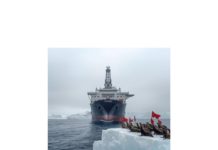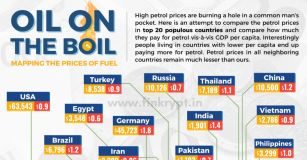MARKET PERSPECTIVE
by J Mulraj
Feb 3-9, 2024
There’s enough for everyone’s need but not for everyone’s greed
Watch this video showing how US Congressional Representatives use insider information, being lawmakers, to trade with enormous profits. See at 8:59 a chart showing returns made on their investment portfolio by ten Congressmen, ranging from 63% to 122%, handsomely beating the 24.8% return of the S&P 500 index. One of them, Richard Blumenthal bought, as per this video, stocks of defense companies the day Russia invaded Ukraine. It’s plausible that the personal gains of congressmen who invested in, and still hold, defense stocks, which benefit from the Ukraine conflict, may make them less keen for a negotiated end to it!
The situation of another, Congresswoman Nicole Malliotakis, is quite piquant. She bought shares in New York Community Bank (NYCB), probably knowing it would benefit from the takeover of assets, at a steep discount, belonging to Signature Bank (SB) as a part of its rescue effort. She was right! The shares of New York Community Bank shot up 40% in a day. Clearly indicating insider trading gains.
Now here’s the piquancy of it. Last week NYCB declared a Q4 loss of $ 252 m. and it’s stock dropped 45% in two days. Moody’s downgraded its rating to junk status. And you know what? The loss of $252 m was because the bank reported loan losses of (hold your breath) $ 552 m. primarily due to soured commercial real estate loans! Which were, probably, the assets bought from SB. What delicious irony!
Policy makers have lately been driving America into the ground. Congressmen, making the law, are profiting from their stock portfolios, thus with less incentive to do the right thing and end a wasteful war. One that should never have been allowed to begin.
A war that has, essentially, been one which America has provided weapons and funding for, and Ukraine has provided bodies, to be killed or maimed; one in which USA has so badly depleted its stock of weaponry, and its treasury, as to be unable, now, to defeat a small group of Houthis threatening global commercial shipping.
Investors should now ask the question whether NYCB is the canary in the coal mine, the first sign of how distress in the commercial real estate (CRE) sector will affect more community banks. Thanks to work-from-home the vacancy rate of commercial buildings is about 20%. Community banks are large lenders to CRE.
Poor policy is also driving down the Chinese economy, which is #2 after USA. Xi inherited a robust economy after it was opened up in late ‘80s by Deng Xio Ping, unleashing its entrepreneurial animal spirits. China became the global manufacturing hub. One of the main drivers of its economic growth was real estate, which grew to contribute 30% of its GDP, building urban residential housing to cater to the huge rural to urban migration. In order to supply the main raw materials for realty, cement and steel, China built up capacities in both, far more than domestically needed. It used surplus cement and steel in its belt and road projects, helping build infrastructure in other countries.
Leading foreign manufacturers like Apple, Mitsubishi Motors, Samsung set up manufacturing bases in China, seeking to cater to their market of 1.3 b people. But, due to things like China’s zero tolerance to Covid, which shut or hampered production, and, recently, a new anti espionage law, under which China offices of Bain & Company, a top management consultancy firm, were raided for carrying out routine market surveys, there has been an exodus of foreign companies seeking to diversify their supply chains. This has created a huge problem of high youth unemployment,
China’s leading realty firm, Evergrande, is unable to pay its over $300 b debt and has been ordered to shut down by a court in H.K. There are some 60-80 m. unsold apartments, so the sector will take time to clear inventory. The strain in its realty sector has affected local, or provincial Governments, which derive a large chunk of revenue through auction of land parcels to real estate firms, local Government debt is too high and a big problem. Depositors of banks in Guizhou are unable to withdraw their deposits indicating a worsening economic situation.
Little wonder, then, that China’s stock market has collapsed, losing $2 trillion in market cap recently, and $7 trillion over three years.
It will take time, and a lot of effort, for China to regain foreign investor trust in both its Equity and Debt markets. Xi Jinping shows no inclination to make such an effort. He believes that the huge industrial base of China, its vast infrastructure and its technological prowess, will lure back investors. China also faces the prospect of higher tariffs on its exports to USA should Trump come in as the next President. As of now, the only impediment to that would be a disqualification by the court.
The US stock market is heavily skewed towards the Magnificent 7 stocks, viz Apple, Amazon, Alphabet, Meta, Microsoft, Nvidia and Tesla. Expected earnings for the quarter ended Dec 23, for the first 6 of these 7 are expected to be up 53%, cumulatively. And for the remaining 494 in the S&P500 index earning are expected to be down 10.5%. This is not a good sign. Too much concentration risk.
Last week the BSE Sensex ended at 71595, down 410 points.
Ongoing conflicts continue to blur prospects for the future. With all countries over indebted, logically political leaders ought not to embark on conflicts. Yet they do. The Israel-Hamas conflict, and the Co-joined Red Sea disruption of trade by the Houthis, have the potential of engulfing more players and, God forbid, of turning into a world war. Former Russian President Medvedev has stated that if NATO were to attack Russia, it would use nuclear weapons to defend itself. We live in crazy times.
Image Source: https://marketingpad.wordpress.com/2015/10/30/you-scratch-my-back-and-ill-scratch-yours/
Comments may be sent to jmulraj@asiaconverge.com










































COMMENTS